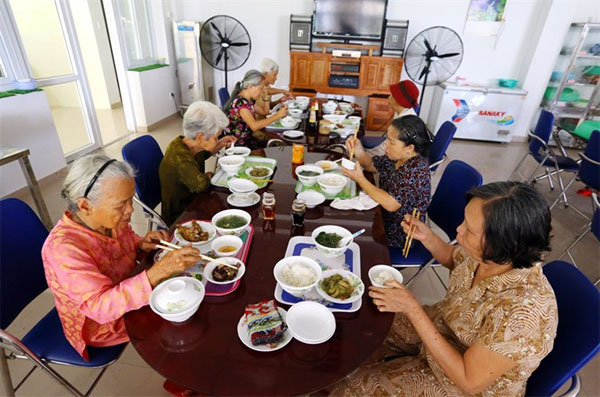[ad_1]
VietNamNet Bridge – The Vietnamese are eating a lot of salty food. However, many people refuse to accept that excess salt in one’s daily diet is not healthy and may cause several non communicable diseases (NCDs)) such as high blood pressure or heart diseases, participants heard at a workshop on Monday.
 |
|
Elderly people have a meal at a nursing home in Da Nang. — VNA/VNS Photo Anh Tuan
|
Speaking at the event, National Institute of Nutrition (NIN) vice director Prof. Truong Tuyet Mai said fatalities caused by NCDs are increasing in Vietnam.
Mai said Vietnam reported 520,000 fatalities in 2012, of which nearly 400,000 deaths, equivalent to 73 per cent, were caused by NCDs. In 2017, deaths caused by NCD have reached up to 411,000, making up 76 per cent of total fatalities. Fatalities caused by heart diseases are 33 per cent, followed by cancer at 18 per cent, Chronic Obstructive Pulmonary Diseases at seven per cent and diabetes at three per cent.
The situation is caused by many factors, especially the high rate of smoking, being overweight, lack of physical exercise, high blood pressure and eating fewer vegetables.
Le Bach Mai, an NIN nutrition expert, said salt intake of over 5g per day may be harmful for people’s health according to the World Health Organisation (WHO) recommendation.
“A bow of pho noodle has 3.4 to 4.6 grams of salt. It means that by eating just breakfast, you have completed the daily salt requirement for one’s body,” Mai said.
Mai suggested people reduce daily salt intake for NCD prevention by reducing salt in home food, eating fresh food and vegetables and minimising the use of processed and braised food.
Do Thu Hien, a housewife in Hoang Mai District, said her family is used to eating salty food.
Hien said she was aware excess salt intake was not good for people health. However, Hien and her family were having trouble reducing their intake of salty food.
“We usually added more salt to food when we cook at home. We also add fish sauce to food we eat every day,” Hien said.
Hien said she would try to reduce salt in the food her family eats.
“A person just needs 1-2g of salt per day. However, a survey in 2015 showed that a Vietnamese person consumed up to 9.4g daily, nearly doubling the recommendation level of WHO,” Lai Duc Truong, an expert from the organisation in Hanoi, said.
“Salt intake of the Vietnamese has reached up to nearly 10g per day. This will lead to NCDs related to high blood pressure, stomach cancer, kidney failure and asthma,” Truong said.
Truong said 77 per cent of salt intake in developed countries comes from processed and restaurant food, in comparison with 20 per cent in Vietnam.
“Some 70 per cent of salt intake comes from home cooking and 10 per cent is added to food while eating in Vietnam,” Truong noted.
WHO has said reducing salt intake to less than 5g per day will save 2.5 million lives every year, according to Truong.
Vietnam has set a plan to reduce 30 per cent of salt intake in the daily food ration of Vietnamese people to 6.6 grams per day by 2025 to reduce risks of NCDs such as diabetes, high blood pressure and cancer. The move is a part of efforts to achieve nine global targets set by WHO to prevent NCDs from now to 2025.
Source: VNS
| related news |
[ad_2]
Source link
